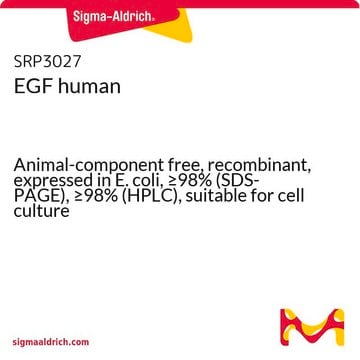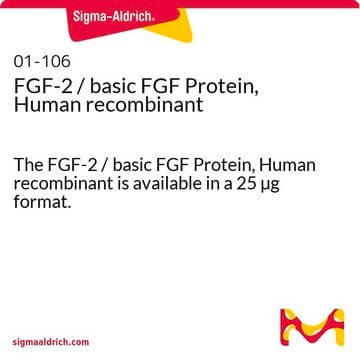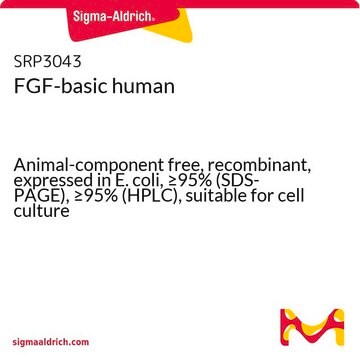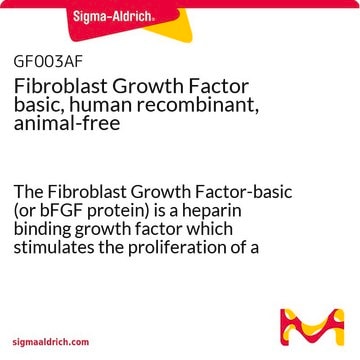SRP4037
FGF-2 human
recombinant, expressed in E. coli, ≥95% (SDS-PAGE), ≥95% (HPLC)
Synonym(s):
FGF-2, Fibroblast Growth Factor-basic, HBGF-2, Prostatropin
About This Item
Recommended Products
biological source
human
recombinant
expressed in E. coli
Assay
≥95% (HPLC)
≥95% (SDS-PAGE)
form
lyophilized
mol wt
~17.2 kDa
packaging
pkg of 50 μg
storage condition
avoid repeated freeze/thaw cycles
impurities
endotoxin, tested
NCBI accession no.
UniProt accession no.
shipped in
wet ice
storage temp.
−20°C
Gene Information
human ... FGF2(2247)
General description
Application
- as medium supplement for E9.5 neuroepithelial cell culture
- as a component in the neurobasal growth medium
- in growing embryonic neural stem/progenitor cells (NSPCs) in a 2D culture
Biochem/physiol Actions
Physical form
Reconstitution
Storage Class Code
11 - Combustible Solids
WGK
WGK 3
Flash Point(F)
Not applicable
Flash Point(C)
Not applicable
Certificates of Analysis (COA)
Search for Certificates of Analysis (COA) by entering the products Lot/Batch Number. Lot and Batch Numbers can be found on a product’s label following the words ‘Lot’ or ‘Batch’.
Already Own This Product?
Find documentation for the products that you have recently purchased in the Document Library.
Customers Also Viewed
Articles
Organoid culture products to generate tissue and stem cell derived 3D brain, intestinal, gut, lung and cancer tumor organoid models.
Organoid culture products to generate tissue and stem cell derived 3D brain, intestinal, gut, lung and cancer tumor organoid models.
Organoid culture products to generate tissue and stem cell derived 3D brain, intestinal, gut, lung and cancer tumor organoid models.
Organoid culture products to generate tissue and stem cell derived 3D brain, intestinal, gut, lung and cancer tumor organoid models.
Our team of scientists has experience in all areas of research including Life Science, Material Science, Chemical Synthesis, Chromatography, Analytical and many others.
Contact Technical Service










